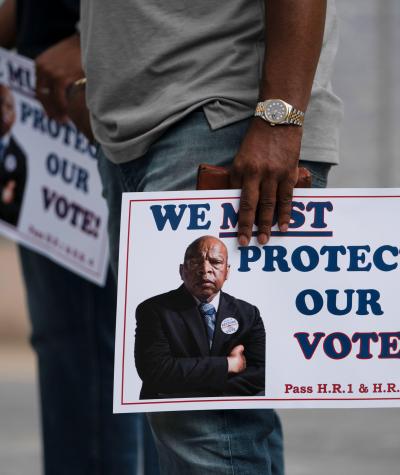When the Voting Rights Act (VRA) was last renewed in 2006, it received overwhelming support from both parties in Congress. Later this year, when the John Lewis Voting Rights Advancement Act is introduced, it should again receive bipartisan support because it would stop future racially discriminatory proposals from being enacted, thus protecting Americans’ freedom to vote.
Signed into law on July 27, 2006 by former President George W. Bush, the most recent renewal of the VRA followed many hours of hearings that demonstrated the persistence of racially targeted policies in our democracy and the continued effectiveness of this law in combatting them.
The VRA did this by establishing a system of preclearance, which required jurisdictions with long histories of voting discrimination to receive approval from the federal government before implementing new voting rules.
This process stopped discriminatory proposals in their tracks before they could be enacted, preventing disenfranchisement from occurring and allowing the number of registered Black voters and Black elected officials to skyrocket in the decades after its initial implementation.
Prior to the 2006 renewal, Sen. Lindsay Graham said when justifying his support for the VRA “South Carolinians, you have come a long way. But we, just like every other part of this country, still have a long way to go.” Similarly, then-Sen. Barack Obama agreed that “Despite the progress these states have made in upholding the right to vote, it is clear the problems still exist.”
In the years since, these problems have only gotten worse. In 2013, the U.S. Supreme Court issued an opinion in Shelby County v. Holder that gutted a key provision of the VRA, invalidating the formula used to identify the cities and states that should be covered under preclearance and rendering the process toothless.
In the wake of the Shelby County decision, states and localities have resumed discriminatory practices like closing polling places and deleting voters from state voter rolls.
Meanwhile, as former President Trump and other prominent politicians have continued spreading lies about the 2020 presidential election, state lawmakers have begun to approve and enact a new wave of anti-voter legislation this year. Much of this legislation aims to create deliberate barriers to voting by limiting voters’ ability to vote early or by mail.
As of July 2021, more than 400 bills had been introduced in 49 states that would decrease voting access, and between January and July of 2021, 18 states implemented 30 laws restricting people’s freedom to vote, according to the Brennan Center for Justice.
Additionally, earlier this month, the Court issued a ruling in the case Brnovich v. Democratic National Committee making it harder–though not impossible–to bring challenges under Section 2 of the VRA. This provision protects voters by prohibiting any voting law or procedure that, “results in a denial or abridgement of the right of any citizen . . . to vote on account of race or color.”
But Congress can safeguard Americans’ right to vote by approving the John Lewis Voting Rights Advancement Act.
Named after former U.S. Rep. John Lewis, the civil rights icon who led the "Bloody Sunday" March on Selma that inspired the passage of the original VRA, this bill would strengthen the freedom to vote for Americans across race and region.
It would make sure that attempts to create barriers to voting that discriminate against voters based on race, color or national origin get federal review, so we all have an equal say in our future.
The John Lewis Voting Rights Advancement Act would amend and restore the original VRA by reinstating the preclearance formula and establishing new review and approval criteria for preventing racially discriminatory voting laws.
The bill would also temporarily stop discriminatory voting changes from taking effect while they are reviewed and mandate that states implement transparency protocols to inform their residents when voting laws in the state are changed.
Under this bill, there would be new voting protections for Native American tribal lands, like equal access to voter registration, polling places, early voting locations and mail-in ballots. Campaign Legal Center (CLC) has repeatedly fought in court to help Native Americans have an equal opportunity to exercise their right to vote.
If the John Lewis Voting Rights Advancement Act were to be enacted into law, it would play a vital role in blocking future racially discriminatory laws from going into effect and ensuring that all Americans can make their voices heard on the issues that matter most to them.
No matter our color, party, or zip code, we all want an equal say in the decisions that shape our future. Democrats and Republicans in Congress should throw their support behind the John Lewis Voting Rights Advancement Act to show their commitment to protecting Americans’ freedom to vote without exception.
